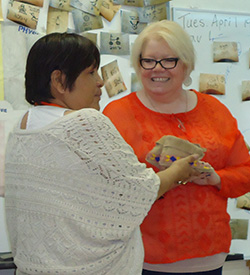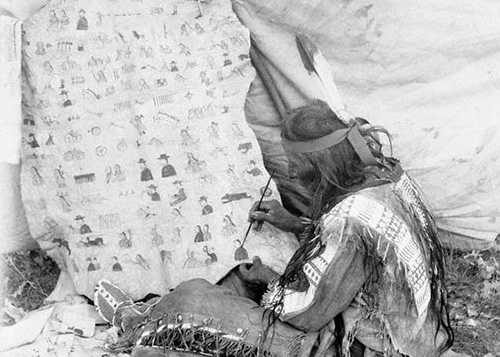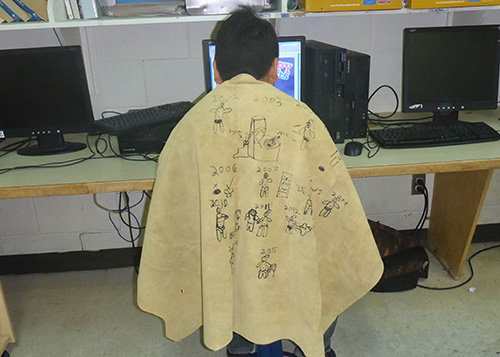Changing the narrative: Reconnecting First Nation youth to their past for a brighter future
Focusing on new ways to engage First Nation youth in their culture and traditions today so that they can enjoy a bright tomorrow

Ms. Deanna Bickford, RN, BScN, MN accepts a gift of moccasins from Ms. Inez Tawiyaka
Ms. Deanna Bickford
Doctoral candidate at the University of Saskatchewan’s College of Nursing, Ms. Deanna Bickford is a CIHR-funded researcher who has contributed to the development and introduction of innovative, pertinent research approaches that are driving equity and enhancing the understanding of health from a First Nation perspective.
CIHR-funded researcher, Deanna Bickford, is project lead on an initiative that explores First Nations ways of knowing and sharing traditional knowledge. She believes that by engaging First Nations youth utilizing a Two-Eyed Seeing approach, acknowledging both traditional and western ways of knowing, they will be able to take control of their health and make informed decisions about healthy lifestyle choices.
First Nation youth are the fastest-growing segment of the Canadian population. Given their important role in Canada’s future, it is vital that we empower them to manage their health and improve outcomes.
6 in 10 — The proportion of off-reserve First Nations people (63.0%) and Métis (63.7%) aged 12 and older who reported a strong or very strong sense of community belonging. Meanwhile, 76.8% of Inuit aged 12 and older reported a strong or very strong sense of community belonging. The corresponding percentage for the non-Aboriginal population was 66.5%.
Source: Statistics Canada
Past research on First Nation people’s health and the effectiveness of existing health systems was by and large based on Western knowledge. The main focus was often on reduction: reduce the individual's exposure to risk and reduce costs to the health care system. The success of this approach has been limited.
Today, First Nations youth are increasingly marginalized. They are at higher risk of developing long-term health related problems, being hospitalized, incarcerated, committing suicide, or becoming infected with HIV, than their non-Indigenous counterparts. Deanna Bickford hopes to make a difference by reconnecting youth to their rich heritage.
Indigenous people have long used oral and visual methods to transmit knowledge from one generation to another, such as the traditional Dakota waniyetu wowapi, or "winter counts." Elders and other important members were consulted by the “Keeper of the Winter Count” and pictographic symbols representing significant plants and animals, ceremonies, health, trade, places, and people were selected and added to a Winter Count, as part of the group’s record of the year.
Changing the narrative and focussing research efforts on how First Nation youth are engaged in learning about the meaning of health and what traditional ways of knowing can contribute to improving health outcomes motivates Deanna Bickford to look to the past for answers to some of today’s most pressing issues.

Winter count

A youth-created winter count
"Without the funding from CIHR-IAPH this work would not have been possible, the youths’ stories would not have been told, and I would not have been able to follow my passion. This work is important in understanding ways of knowing and being and finding paths to living well."
- Date modified: